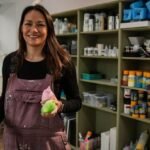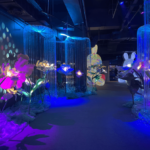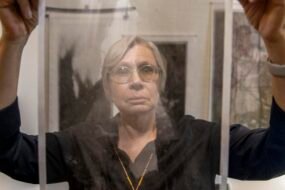
Baltic and Northumbria University have worked together for over a decade, through their formal partnership in the form of the BxNU Institute. One of its aims is to put the North East region of the UK on the map as an internationally significant space for contemporary art learning and practice.
Together we share a vision to support creative talent development, nurture public engagement and enhance the region’s reputation for artistic excellence and growth in the creative industries. Through the Institute, our ambition is to achieve artistic and curatorial excellence, pedagogic sustainability and transformation with communities of people and practice that inform progressive social change and future thinking.
An unprecedented crisis
As a result of educational policy changes and the impact of austerity on arts spending over recent decades, arts education in schools, colleges and universities has been pitched into an unprecedented crisis.
Across different geopolitical contexts, a narrowly financialised discourse of the arts has come to predominate in public culture, often remaindering arts education as comparatively unworthy of financial investment, its ‘outcomes’ seen as of lesser value than those of other disciplines.
The evidence of the damage inflicted by these policies and funding regimes is all around us – in our educational and cultural institutions as well as across our communities. And the slowly unfolding crisis has been reported in mainstream and specialist press and analysed in policy papers including The Sutton Trust’s report A Class Act on social mobility and the creative industries and the Art Now Report commissioned by the All-Party Parliamentary Group for Art, Craft and Design Education.
There have also been collective calls to action such as the manifesto from visual arts organisations.
How else might we assess the value of an arts education?
To address this landscape, the conference brought together academics, artists, community activists, schoolteachers, students, policy makers and leaders of the cultural and creative industries to ask: How else might we assess the value of an arts education? How important, even transformative, are the imaginative, world-making capacities of creative learning for society, the planet, the economy? And how should a changed understanding of what or who we think art education is for affect the way in which it should be delivered?
In asking these questions, we did not set out to re-diagnose the problems of arts education but to come up with solutions to our shared predicament. Above all, we conceived the conference as a collective resource for educators and students from across the sector to share perspectives, propositions and plans: to learn from one another and, together, to develop the tools we need to transform the terms of public debate about the value of a creative education.
The response from the sector was overwhelming. In addition to workshops, roundtables, performance lectures and gallery talks we programmed twenty panels that variously addressed education, learning, the value of arts education, rethinking the national curriculum among many other subjects.
The conference opened each day with powerful keynote provocations: Bolanle Tajudeen, curator and founder of Black Blossoms School of Art and Culture, and Turner Prize winning artist Jesse Darling both spoke of how their experience of art education had shaped their respective social, political and psychological lives as artist/curators, educators and parents.
Continues…

(l to r) Prof Fiona Crisp, Northumbria University; Dr Heather Robson, Northumbria University; Sarah Munro MBE, Baltic Centre for Contemporary Art; Prof Andy Long, Northumbria University; Prof Gavin Butt, Northumbria University. Photo: Baltic Centre for Contemporary Art
The youth voice
On day two, Baltic’s Young Producers – a group of 15–18-year-olds – told of their unique experience of art education and the Baltic curriculum, speaking to the idea of freedom, or lack of it, in arts education, using their own narratives to suggest change.
“Schools are facilitators, so why are so many children deficient in this part of their education? Each child – immigrant or not, white or not, local or not – has a right to be culturally, environmentally, academically and spiritually educated.”
“A [grade] 9 in Art is as valuable as a 9 in Chemistry, and an A level in Drama is as serious as an A level in Physics and degree in Humanities is as intellectually challenging as a degree in STEM. The arts is academic and brilliant, and always will be. So, it’s time to start treating it like so from the beginning of our art education.”
The outcomes
A key achievement of the conference was addressing the issue of creative education in its entirety. Contributions came from educators, students and practitioners across education – primary/secondary and Further Education/Higher Educations – as well as from those working in communities, the cultural sector and creative industries. This allowed often siloed sectors to speak to one another, fostering agency and confidence in creating solutions for creative education as a whole ecosystem.
The BxNU Institute is now building on this dynamic though the development of sector resources. Working with key educational bodies, short-form publications will be designed to help inform educators in schools, colleges, universities and community settings to advocate for the value of arts education and to share solutions to current pedagogic and institutional challenges.
In addition, the institute is working to establish a book series, focused on issues arising from the conference. These will include original research and creative work presented in thematic edited volumes, monographs and artists’ books.
*’Have Some Imagination: Towards a Manifesto for Arts Education’ was a free, two-day international conference co-presented by Baltic Centre for Contemporary Art, Gateshead and Northumbria University, Newcastle held on 7-8 February 2025.










